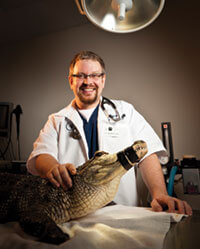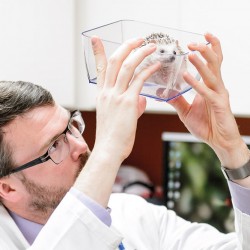Michael Wenninger DVM’04: Exotic Animal Vet

Veterinarian Michael Wenninger made national news when he treated two injured alligators that were flown in from Pennsylvania. He specializes in exotic pets and has treated creatures ranging from a dyspeptic sloth to a tarantula needing a leg amputation. Wenninger himself owns 12 pythons. Photo: Andy Manis.
A typical day for veterinarian Michael Wenninger DVM’04 brings to mind something that you’d see on Animal Planet.
Yes, he cares for traditional pets such as dogs and cats, but Wenninger’s patients at Spartan Animal Hospital in McFarland, Wisconsin, also include rare birds, venomous snakes, lizards, and even alligators. In early November, CNN covered his treatment of two American gators that had been flown to Wisconsin after they were injured during a break-in at a Pennsylvania home.
Until Wenninger arrived in summer 2011, Spartan had not treated exotic animals. Yet in one ten-day period after Thanksgiving, he treated a hedgehog, several geckos and pythons, a ferret, a tarantula, and a pair of birds — as well as the alligators earlier in the month.
In his career, he’s treated bears, big cats, kangaroos, a pair of Komodo dragons, a bison, and — what he considers his strangest animal — a sloth with a gastric condition. He’s also amputated the leg of a tarantula.
“My interest in these kinds of animals started when I was a little kid, and I always had snakes and [other] reptiles at home,” says Wenninger, who grew up in Kewaskum, Wisconsin. “My parents made the mistake of saying that if I caught a snake, I could keep it. So I did.”
From the age of four, Wenninger knew he wanted to be a vet. After one year at UWC-Washington County and another on the Madison campus, he had earned enough credits to qualify for the university’s four-year veterinary medicine school.
“[Madison] was very exciting, with a ton of things to do,” he recalls. “Everyone was very friendly and outgoing. What I miss most about college is the time with friends. I enjoyed the learning, but once you get out of [vet] med school, you realize the learning is just beginning.”
During school, Wenninger gained experience at zoos in Toronto and Denver. He also spent time in the Florida Keys at a practice that specializes in reptile medicine.
After graduation, he worked for two different practices in Pennsylvania. However, once he and his wife had a baby boy, “We knew we wanted him to grow up in Wisconsin,” he says.
These days, Wenninger’s collection of home “pets” includes three dogs, a cat, a blue-and-gold macaw, and twelve pythons, the longest of which is nineteen feet. He explains that his professional and personal experience with exotic pets has given him a different perspective on people who own such animals.
“Everyone thinks that exotic-pet owners are these weird, drug-addict people,” he says. “Most of the owners I know are professional, well-educated people who take care of their pets. Yes, some of the owners shouldn’t [have] these pets, but I know exotic-pet owners who treat their pets better than a lot of people treat their kids. And there are people with dogs and cats who do a terrible job of [caring for] them.
“I knew a guy who had a mountain lion as a house pet. The cat was raised from the time he was a kitten. That owner would do anything for that cat, regardless of costs or medical procedures.”
Published in the Spring 2012 issue



Comments
kayla June 27, 2012
I’m planning on becoming an exotic animal vet when I’m older, but right now I have NO idea how to care for exotic pets. I have a tarantula. I dont know how old she is, but she just molted last week. I noticed white mites on her fangs and abdomen (i think thats spelled wrong). I was wondering if the mites would harm her, and how to get rid of them. I was told to pour water on the mites 2x a day to get rid of them, but they kept coming back, so i’m not doing it any more. thx.